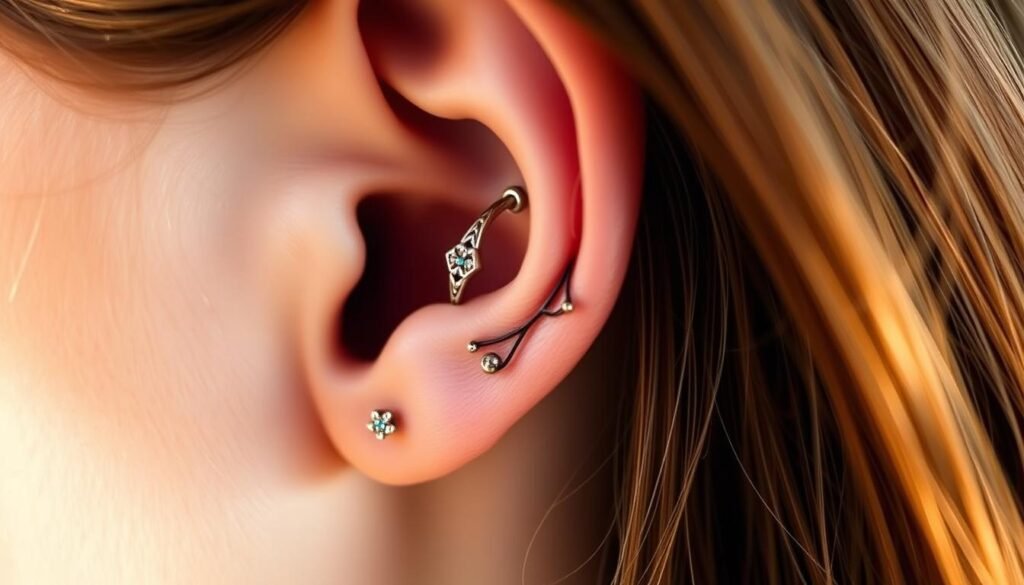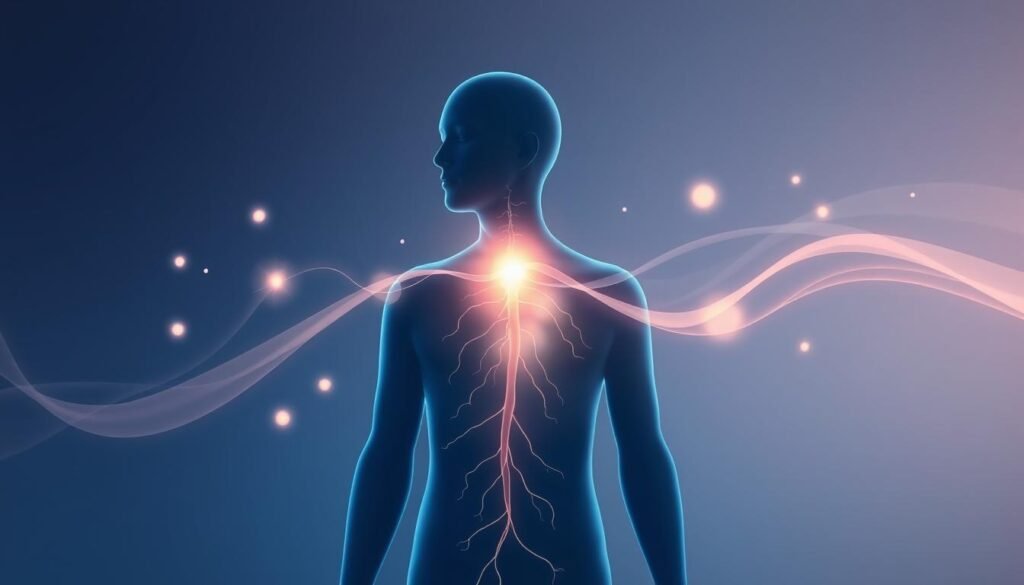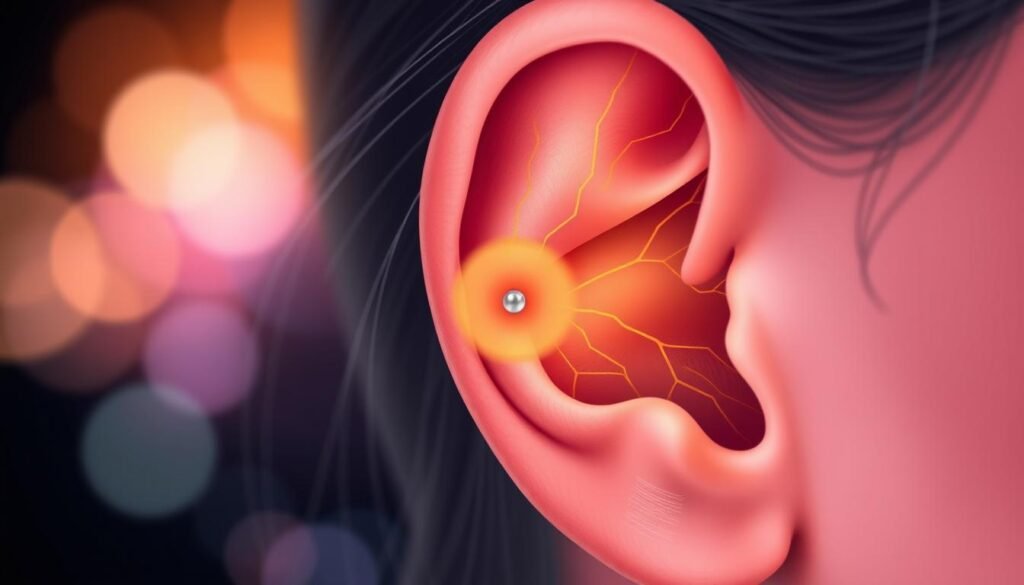A study from the London Migraine Clinic showed interesting results. They found that 30 out of 42 patients felt better in terms of headaches 1 to 4 months after getting a daith piercing. Their symptom-free days increased from 6.4 to 19.7 per month. Anxiety piercings, especially daith piercings, have grown popular for those looking for relief from anxiety.
People like body piercings for their looks and potential health benefits. But, it’s crucial to know both sides before deciding. This article will cover everything about daith piercings, including how they might help with anxiety and migraines. We’ll also look into what getting one involves, and the possible risks and benefits.
Making the decision to get a cartilage piercing like this shouldn’t be rushed. Take the time to consider if it’s right for your health and personal goals.
Key Takeaways
- Daith piercings may potentially alleviate anxiety symptoms by stimulating pressure points.
- Anecdotal evidence suggests improved mood and headache relief for some individuals.
- Complications can arise from daith piercings, with up to 35% experiencing issues.
- Healing time for daith piercings is longer due to their location, taking up to 9 months.
- Proper aftercare is essential for minimizing risks and ensuring successful healing.
Understanding the Anxiety Piercing
The idea of an anxiety piercing, especially the daith piercing, is getting popular. People like it for its look and possible calm feeling it gives. The daith piercing is thought to hit spots that may help calm you down.
But, there’s no solid proof that it works like many hope. Some think it works like acupuncture, pressing on a nerve to relax you. A few people say they felt less anxious after getting it. However, experts haven’t found strong proof to back up these claims.
Remember, getting a daith piercing means a long healing time of up to 12 months. This spot is tricky and could get infected easier than earlobe piercings.
A lot of Americans, 42% of men and 60% of women, have piercings. This shows many see piercings as a personal statement. But, if you’re thinking about a piercing for anxiety relief, consider the safety and real benefits carefully. There’s a risk of pain and other problems with up to 35% of ear piercings.
Though some say a daith piercing helped their anxiety, it’s key to talk to a pro if anxiety hits hard. It’s better to look into tested treatments and support. To learn more, check out the discussion on anxiety piercing.
What is a Daith Piercing?
The daith piercing is now a famous option for people looking into body modification, especially for anxiety relief. It’s in the ear cartilage, right above the ear canal. This makes it different from lobe or tragus piercings.
Unlike regular ear piercings on the lobe, the daith piercing is in a complex spot. It’s linked to acupuncture and pressure point therapy ideas. Some think it can lower anxiety and headaches, like acupuncture does.
There are stories of the daith piercing easing anxiety, but no science proves it yet. This cartilage piercing got popular in the 1990s thanks to Fakir Musafar. He was a big name in body modification, and he made people interested in its possible benefits.

If you’re thinking about getting a daith piercing, remember there’s no solid proof it works. Always talk to a professional before trying this ear piercing. Even though some stories are inspiring, be careful. It’s important to know what might happen with this body change.
The Connection Between Anxiety and Vagus Nerve Stimulation
The vagus nerve is vital to our autonomic nervous system, affecting both body and mind. It links the brain with major organs like the heart and the digestive system. People look to vagus nerve stimulation for anxiety relief, aiming to tap into the body’s way of handling stress.
Studies show that stimulating the vagus nerve might help with anxiety. It appears to trigger calm by activating the part of our nervous system that relaxes us. This has caught the eye of many who deal with ongoing anxiety issues.
Those who try vagus nerve stimulation, through medical or alternative means, often see their anxiety lessen. This can bring a healthier emotional balance and cut down on stress. It’s a promising avenue for finding new ways to ease anxiety.

Vagus nerve stimulation isn’t just for anxiety. It also shows promise for epilepsy and depression. As research goes on, scientists are keen to learn how it affects mental health. They’ve found that it can lift mood and life quality, proving its worth in mental health care.
| Condition | Effect of Vagus Nerve Stimulation |
|---|---|
| Epilepsy | Up to 50% decrease in seizure frequency |
| Treatment-resistant Depression | Improvement may build over several months |
| Anxiety | Potential reduction in anxiety symptoms |
| Chronic Pain | Explored for management and relief |
| Fibromyalgia | May enhance quality of life |
Learning about the vagus nerve and its link to anxiety offers hope for new treatments. For those seeking ways to manage anxiety, this knowledge could mean a big leap towards better health and coping methods.
How the Anxiety Piercing Is Said to Work
The daith piercing affects the vagus nerve, which is key in dealing with stress. This nerve’s role is crucial for our stress reaction. Because of where the daith piercing is placed, it puts pressure like acupressure does.
People think this piercing helps with anxiety and makes you feel better emotionally. Frontiers in Neurology published a study showing vagus nerve stimulation may change how we feel pain. This could help not just with migraines but with tension headaches too.
Some stories suggest the shen men spot, where the daith piercing is, might help lower stress. But, there’s not much science to prove this yet. For those looking into how to handle anxiety, knowing about old methods like focusing your mind and deep breathing is key. More on this can be found in stress management techniques.
Even though the idea is interesting, we don’t have a lot of proof that the shen men piercing helps with anxiety. Studies do suggest acupuncture might help, but we don’t have firm evidence for daith or shen men piercings and their effect on migraines or anxiety.

Some stories say daith piercings can lessen migraines and help emotional health. Yet, scientists say we need better studies to really know its effect on the vagus nerve and anxiety. People should also think about risks like pain and infection, especially since the piercing is in cartilage.
Potential Benefits of an Anxiety Piercing
People often turn to a daith piercing looking for relief from stress and anxiety. Some report feeling better after getting one. They say it helps with headaches and migraines too.
A study shared a story about a woman, 47, whose migraines stopped almost right away after her daith piercing.
A survey by the London Migraine Clinic found interesting results. It showed 75% of folks with daith piercings saw migraine improvement. But Dr. Emad Estemalik warns such results might be a temporary placebo effect.
Yet, daith piercings have grown popular despite some risks. About 35% of people with ear piercings face issues like pain and allergies. Plus, no strong science backs up daith piercing as an anxiety cure.
Experts suggest trying established treatments for anxiety, such as psychotherapy, instead. But, if you’re curious about daith piercing as an option, talk to a doctor first. And, it’s good to connect with others who understand. Visit this link to find support groups.
Are There Risks and Side Effects?
Many seek daith piercings for anxiety relief. Yet, it’s crucial to know the risks of daith piercing and possible side effects. Over a third might face complications post-piercing, including various infections.
Infections could be mild or severe. Serious risks encompass infections like cellulitis, and diseases such as HIV, hepatitis B or C, and tetanus. Such severe cases underline the need for safety. Always choose a reputable piercer.
- Skin reactions like dermatitis or allergic responses can occur.
- Keloid scarring might develop in some individuals.
- Pain can persist beyond the initial piercing experience.
- Failed treatment may lead to emotional distress, particularly if individuals do not find the expected relief from anxiety or headaches.
Experts on migraines and headaches often advise against daith piercings as a treatment. This advice comes due to the high risks of daith piercing. While vagus nerve stimulation shows some potential, there’s little to prove it helps with anxiety or pain through this method.
Aftercare is crucial for avoiding infections. Wash the piercing with soap and water regularly. Also, apply rubbing alcohol twice a day to ensure piercing safety. Consulting a licensed professional is a wise step for proper care tips and to avoid complications.
What to Expect During the Piercing Procedure
It can be nerve-wracking to get a daith piercing. Knowing what happens helps ease fears. It’s important to choose a skilled piercer who uses the right techniques.
Practitioners make sure you’re ready before starting. About 70% of first-timers feel nervous. They’ll often wait 5 to 10 minutes for you to relax first.
Many people use relaxation techniques before going. About 60% say it helps with their anxiety. Breathing exercises can also ease discomfort during the process.
Many wonder about the pain of getting pierced. Earlobe piercings usually hurt less than cartilage ones. Knowing this may ease some worry. Also, feeling more confident after is common. Around 80% feel positive about their new piercing.
Aftercare is very important. Following care instructions lowers infection risks. Watching for signs like bleeding or swelling helps healing. Taking these steps eases worry post-piercing.
The journey of getting a daith piercing is special. Learning about the process can make it less scary. It’s often more fun with friends or family.
To learn more about the emotional side of piercings, check out this resource.
Factors Influencing Piercing Pain Management
Pain management when getting a piercing is complex. It depends on how much pain a person can handle and the piercer’s skill. Everyone has a different pain limit. Some people find it easier than others. A skilled piercer can make the procedure less painful. This makes choosing a professional piercer very important for a good experience.
Care after getting pierced is also key to healing and comfort. Keeping the area clean and avoiding things that can irritate it is crucial. Simple actions like deep breathing, using ice, and talking openly with the piercer help. Knowing about proper care and follow-up can greatly improve your piercing experience.
The emotional side of getting pierced matters too. Some people might be more sensitive because of past painful experiences. Recognizing these feelings and having real expectations about pain and healing can help. Being emotionally ready, along with professional care and the right aftercare, can make getting pierced a better experience.